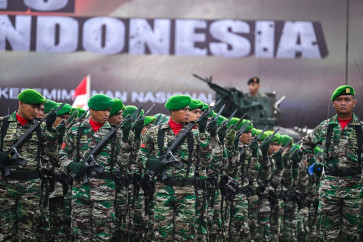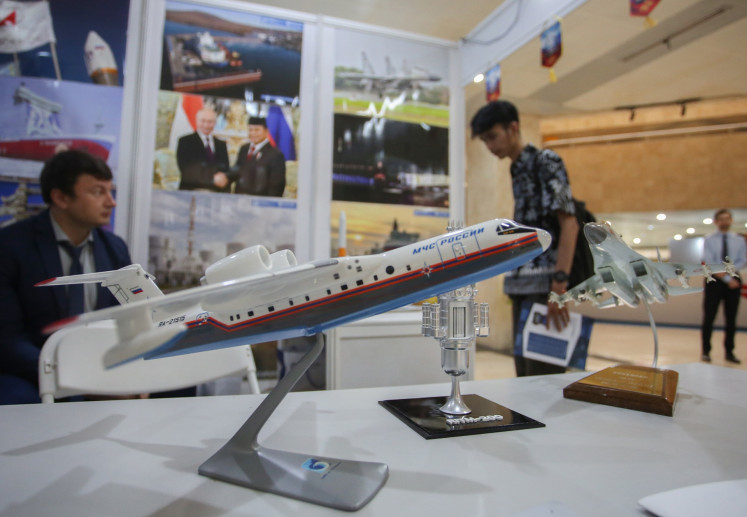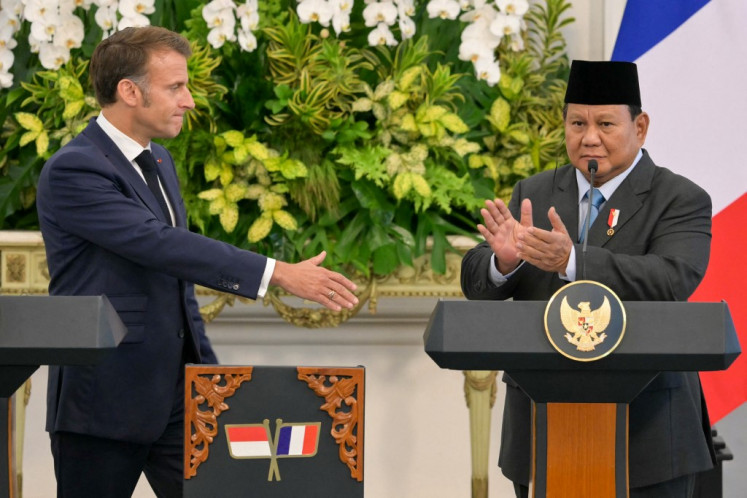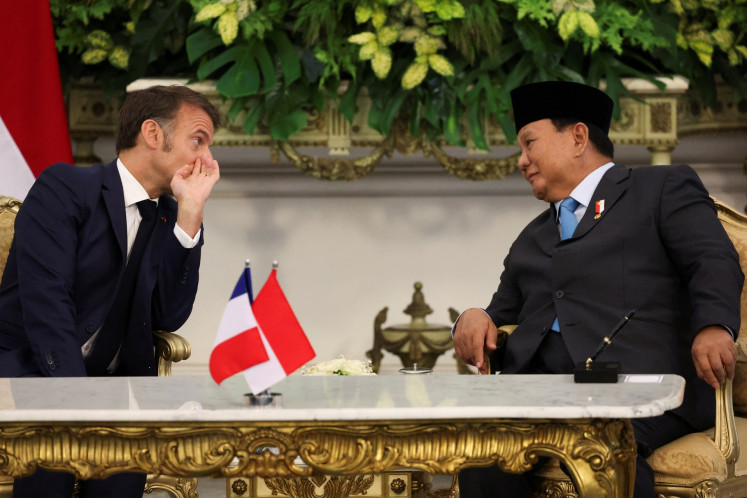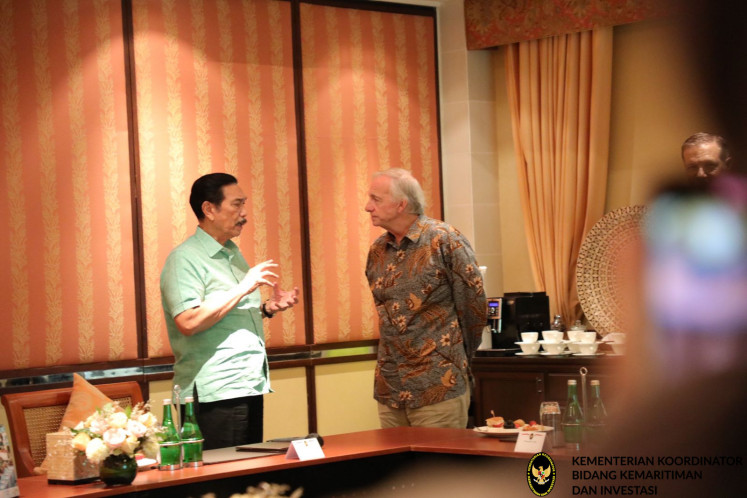Indonesia and China redefine regional ties
If Indonesia can ensure that its cooperation includes not just capital, but skills and innovation, then this phase of Sino-Indonesian partnership could prove transformative.
Change text size
Gift Premium Articles
to Anyone
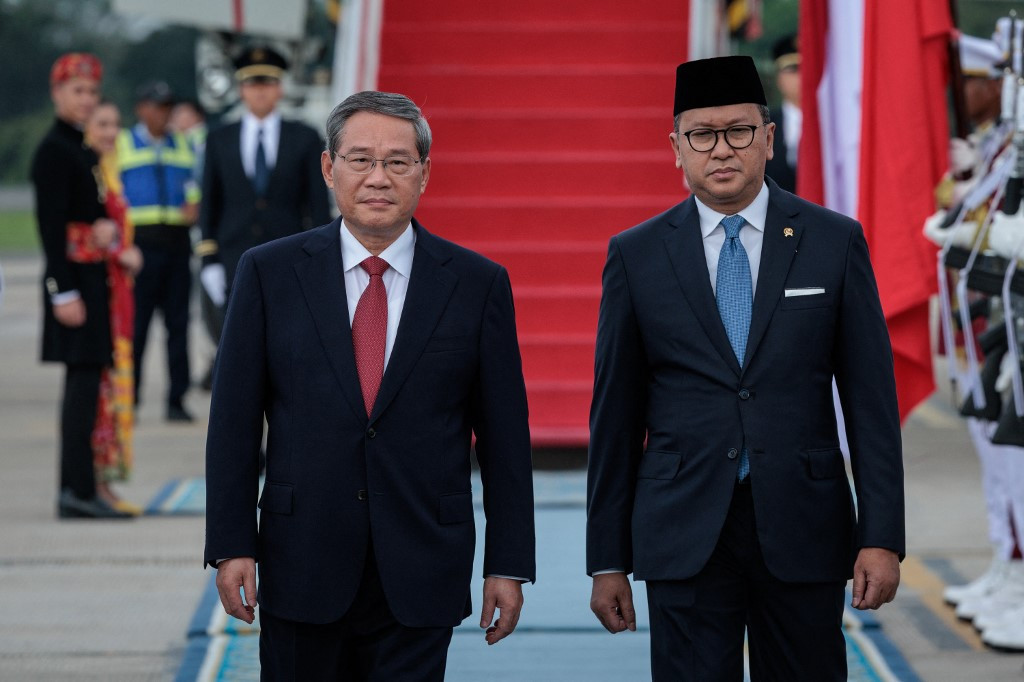 China's Premier Li Qiang (left) walks with Investment and Downstream Minister Rosan Roeslani upon Li's arrival at Halim Perdanakusuma International Airport in East Jakarta on May 24, 2025. (AFP/Yasuyoshi Chiba)
China's Premier Li Qiang (left) walks with Investment and Downstream Minister Rosan Roeslani upon Li's arrival at Halim Perdanakusuma International Airport in East Jakarta on May 24, 2025. (AFP/Yasuyoshi Chiba)
I
n a world marked by geopolitical fault lines and economic decoupling, Indonesia and China’s renewed economic courtship, cemented through fresh memorandums of understanding ahead of the ASEAN Summit in Kuala Lumpur, represents a telling counter-narrative. Rather than choosing sides in an increasingly bipolar order, these two nations are pursuing a pragmatic and mutually advantageous agenda grounded in historical precedent, regional autonomy and global economic logic.
The agreements, estimated to bring over US$8.8 billion in investment and 25,500 jobs, may not make headlines in the West. But they reveal the tectonic shifts occurring in Southeast Asia, a region that has learned to thrive on engagement rather than confrontation.
At a time when protectionism and great-power rivalry threaten to pull developing economies into ideological camps, Jakarta and Beijing are charting a different path, one that reflects both a hard-nosed realism and a deep historical understanding of the region’s position in global affairs.
Indonesia’s decision to deepen economic cooperation with China is neither sudden nor surprising. From the Belt and Road Initiative’s infrastructure projects to the recently operational Whoosh high-speed rail line, the trajectory has been clear.
What is changing is the tone and the timing. President Prabowo Subianto’s government, still early in its tenure, is signaling both continuity with his predecessor and a desire to cement Indonesia’s central role as a pivot between the Global North and South.
It is notable that these agreements come not in isolation, but as part of a coordinated effort by Beijing to reengage Southeast Asia amid rising tensions with Washington. Last month, Chinese leader Xi Jinping made visits to Vietnam, Malaysia and Cambodia, securing economic pacts and cultural agreements. The emphasis is unmistakable: The future of global economic resilience, in China’s eyes, runs through ASEAN.
The global context lends urgency to this outreach. United States-China tensions have hardened into a structural rivalry, characterized by tariffs, tech bans and political distrust. The administration of President Donald Trump, like Joe Biden’s before it, continues to pursue strategic decoupling. Meanwhile, ASEAN economies, especially those like Indonesia that depend heavily on exports and foreign investment, have everything to gain from diversification and diplomatic balance.
In this light, the emphasis on using local currencies in bilateral trade between China and Indonesia should not be misunderstood as a geopolitical snub to the US dollar. Rather, it reflects a growing desire for economic sovereignty in a multipolar world. Local currency settlements reduce transaction costs, mitigate exchange-rate risks and, most crucially, insulate bilateral trade from third-party financial pressures.
From a historical perspective, such pragmatism is deeply rooted in Indonesia’s diplomatic DNA. In 1955, Indonesia hosted the Bandung Conference, which launched the Non-Aligned Movement. That spirit, neither East nor West, but a strategic engagement with both, remains alive.
During his Jakarta visit, Chinese Premier Li Qiang referenced this lineage explicitly in his remarks, invoking the "Bandung Spirit" as a model for today’s global crossroads. It is a poignant reminder that history’s shadows still guide present-day decisions.
Critics may point to the ongoing maritime disputes between the two countries, especially over Chinese vessels entering Indonesia’s Exclusive Economic Zone in the North Natuna Sea. These flashpoints are real and consequential. But they have not derailed cooperation, because both governments understand that disputes in one domain need not undermine collaboration in another.
The mature management of these tensions suggests a level of diplomatic sophistication rarely acknowledged in popular discourse. Rather than allowing nationalist pressures to drive zero-sum thinking, Jakarta and Beijing are compartmentalizing their disagreements and focusing on achievable gains. That is not appeasement, it is strategic depth.
Moreover, Indonesia has shown itself willing to push back when necessary, as evidenced by its protests and recent naval assertiveness in contested waters. It has done so without dramatics, and without compromising its economic agenda. In this, Prabowo's administration is threading a difficult needle: asserting sovereignty while sustaining stability.
Beyond diplomacy, the economic dividends of these agreements deserve attention. The commitments made are not abstract promises; they are targeted investments in manufacturing, logistics, renewable energy and industrial zone expansion. These are sectors that, if developed with long-term vision, can accelerate Indonesia’s move up the value chain. The potential creation of over 25,000 jobs in the immediate term is only the start.
Even more promising is the potential for technology transfer. Chinese firms, especially in electric vehicles, battery technology and renewable infrastructure, are increasingly global leaders. If Indonesia can ensure that its cooperation includes not just capital, but skills and innovation, then this phase of Sino-Indonesian partnership could prove transformative.
Li’s remarks during his visit carried a broader message for the Global South: that leadership does not require alignment with one of the world's superpowers, but rather a clear articulation of national interest, backed by credible commitments and partnerships. In this sense, Indonesia is emerging not just as a regional economic hub, but as a moral anchor in an age of uncertainty.
Indonesia and China are both members of BRICS and the Group of 20, and their partnership signals an alternative vision of globalization, one based not on confrontation, but on shared growth and equitable cooperation. While the West debates decoupling and reshoring, Southeast Asia is betting on connectivity.
That ASEAN has managed to remain relevant and cohesive amid these pressures is itself an accomplishment. Its members continue to engage with both Washington and Beijing, without succumbing to the pressures of either. This summit in Kuala Lumpur, bringing together ASEAN, China and the Gulf Cooperation Council, is proof that a multipolar dialogue is not only possible, but increasingly necessary.
The Indonesia-China economic agreements signed ahead of the ASEAN Summit are not just about investment figures. They are about positioning, about asserting that regional cooperation, historical memory and economic rationality still have a place in international relations.
The two nations demonstrate that pragmatism, not ideology, may yet offer the best chance for peace and progress in the 21st century.
***
The writer is a political and defense analyst based in Bangladesh.



